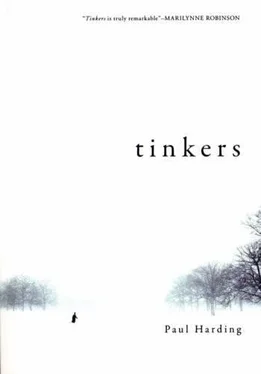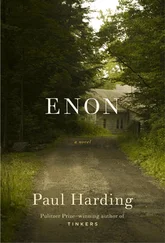Howard said, Lady Godiva-
Jack said, She's a dollar a day.
Howard said, A dollar.
Jack said, Plus oats.
Plus oats.
The men looked at their hands, at the chickens.
Well, I suppose I can walk.
I suppose.
Well, thanks, Jack.
Don't mention it, Howard.
Howard walked past his house without telling Kathleen that Levanseller wanted a dollar for Lady Godiva and that he had decided to walk. She would make him go back, even though a dollar was twice what he made most days, after he paid Cullen back the cost of its brushes and hairpins and the penny or two profit afterward. He walked past the house, with its tall front windows and chipping gray paint and rotting unpainted shutters, sitting in its nest of winter grass and snow. It was bright outside and dark inside, but as he passed he shaded his eyes and looked into the dining room and could just see the table and empty chairs.
After Howard has passed beyond sight of the house, Kathleen stops her washing, dries her hands on the front of her apron, and goes into the house. She climbs the stairs to her bedroom on tiptoe, even though she does not have to hide the fact that she is going to her room. She enters her room and opens the bottom drawer of her bureau. The bureau stands directly next to the doorway. She fishes around in the back of the drawer and pulls out the wool sock in which she hid the brochure for the mental hospital. She removes the brochure from the sock and without looking at it places it in full view on the corner of the top of the bureau and returns to her washing.
It was not difficult for Howard to find his son. The fresh wagon and mule tracks left from the yard, away from town. Howard walked along the road and looked at the winter weeds poking up from the new snow. There was more variety than Howard had ever noticed. There were papery shells of burst pods and thorns and whitish nubs at the ends of pannicles. Some were bent over, broken-backed, with their tops buried in the snow, as if they had been smothered in the frost. The interlocking network of stalks and branches and creepers was skeletal, the fossil yard of an extinct species of fineboned insectoid creatures. All of these bones, then, seemed to have been stained by sun and earth from an original living white to brown, and not the tough fibrous flower and seed-spilling green they actually once had been. Howard wondered about a man who had never seen summer, a winter man, examining the weeds and making this inference-that he was looking at an ossuary. The man would take that as true and base his ideas of the world on that mistake. He would concoct narratives about when those thorny animals picked through the brush and fields, sketch outlandish guesses, publish papers, give talks in opulent rooms to serious men all wearing the same formal suits, draw conclusions, get it all wrong. Howard thought, I do not even know if that is ragweed or Queen Anne's lace.
When he came to the turnoff for Ezra Morrell's farm, he saw the wagon tracks turn with it. There was a moment of sorrow, disappointment, and deep love for his son, whom he at that second wished had had a chance of real escape. Never mind why or whether or who or what consequence or ramification-the wake of sorrow and bitterness and resentment you would trail behind you, probably mostly for me-I just wish that you had made it beyond the bounds of this cold little radius, that when the archaeologists brush off this layer of our world in a million years and string off the boundaries of our rooms and tag and number every plate and table leg and shinbone, you would not be there; yours would not be the remains they would find and label juvenile male; you would be a secret, the existence of which they would never even be aware to try to solve. An image arose in Howard's mind of an archaeologist examining the small bones of George's hand and explaining to his colleagues that the boy whose bones these had been had at one time been bitten by another person, an adult, perhaps as part of some savage ritual or because people were more like wild animals in this place in those times than had ever previously been imagined.
Howard stepped into the shed. Light came between the log cribbing where first the original grass and mud and then the wadded-up comics pages from Sunday newspapers had dissolved.
George. Where are you?
Here I am, Daddy.
Where?
Here. George crawled out from behind the old door.
Howard's eyes adjusted to the dim interior of the shed. He made out George's face peeping from behind the old door. He remembered the fire. He remembered the story about the woman and the children. He thought, My son hiding behind the ruins, my son hiding behind the last burned token of a house. Houses can be ghosts, too, just like people. And when he thought this, it was because he realized that whenever he imagined (Am haunted by, really, he thought, because that is what ghosts are, what they do, whether they knock plates of off shelves or blow a door open at night or simply present themselves in our minds, it is all haunting) that woman and her children, they were always in the house, which, like them, was gone from this earth. And we were like the men giving papers on the skeletons lining the ditch; we were certain the bones were those of Addie Budden and the kids, but they were not. So there is my son, hiding behind the last vestige of a house transformed from timber into ash into the dimming memories of those who still remember it. If the door survives us all, it will be, like most things, just another relic sitting (somewhere, somewhere not here, even, but somewhere unlikelyin the grass of the plains, a swamp island in the bayou, down an Arctic crevasse among other artifacts perhaps not yet even made but heading towards made, being pulled toward being made (or fashioned: made in the sense that they are and always have been latent in living wood, in underground seams, in stars and the black sky), but even then, before made, rushing toward their being unmade and perhaps made again. Everything is made to perish; the wonder of anything at all is that it has not already done so. No, he thought. The wonder of anything is that it was made in the first place. What persists beyond this cataclysm of making and unmaking?
So there is my son, already fading. The thought frightened him. The thought frightened because as soon as it came to him, he knew that it was true. He understood suddenly that even though his son knelt in front of him, familiar, mundane, he was already fading away, receding. His son was fading away before his eyes and that fact was inevitable, even though Howard understood, too, that the fading was yet to begin in any actual sense, that at that moment he and his son, the father standing in the dimness, the son kneeling and partly obscured by the charred door, were still only heading, not yet arrived, toward the point where the fading would begin. Howard simply knew that that point was coming and that he somehow had caught a glimpse of its existence beforehand, as if the moment were like the burned door: an object sitting in the shed, leaning among the rusty old saws and spades and rakes, but also as unimaginable and unknowable as his extinct creatures with grass bones.
Mother's worried, George. You have to come back.
I know, Dad.
George stood and walked to his father. Howard put his hand on his son's shoulder for a moment and looked into the boy's eyes. He seemed about to speak but then smiled and removed his hand. George climbed onto the cart and Howard untied Prince Edward. The mule responded much more readily to Howard's guidance, and father and son drove back to their house without speaking.
The next evening, Howard passed by his house before he realized he had seen a brochure for a place called the Eastern Maine State Hospital that morning on his wife's dresser and that she was planning to have him committed there. He passed out of the center of town, heading south. Dinner was on the table in the house. Everyone sat at their seats, wordless, waiting for him to turn in to the dirt driveway and tether Prince Edward and give him hay and then to come inside and say grace, which he always ended with the words, And God let us perceive that there is nothing better than that a man should rejoice in his own work. Amen.
Читать дальше












